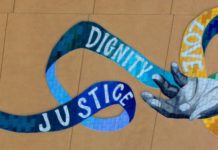Thoughts on Psychiatric Incarceration When Not Guilty by Reason of Insanity
We are, more and more, as individuals with “mental health diagnoses,” living in a reality of senselessness, absurdity and and arbitrary outcomes. While I often believe that our movement simply calls itself a movement, but does not really move at all, it is in fact possible today to say that we are part of a post-Justina movement. The attention to her case highlights both the senselessness and the absurdity, but perhaps not the arbitrary nature of how the system functions for those it impacts.
Lithium
In this piece for Healing Journey, Anne O'Beirne briefly summarizes the history of the medical usage of lithium and describes the impact that the drug has...
Are We Not Human Beings with the Rights to be Treated as Human?
(Speech delivered by Daniel Fisher at the rally in front of the Boston State House, June 2,2012)
How can residents of Judge Rotenberg Center (JRC)...
Life Lessons and Trauma Informed Care
My first real introduction to the world of madness and “mental illness” was when I was 21 years old and I left home to start my mental health nurse training. Reflecting on my own experiences has led me to consider how the trauma of participating in the psychiatric system can affect the way we care for others.
The Risk That Survives a Psych Ward Stay
From OZY: The suicide rate for former psychiatric inpatients is 44 times higher than that of the general population. According to Australian psychiatrist and professor Christopher Ryan,...
Getting Involved in Prison Issues – Making Alliances With Mental Health Advocacy
In my recent Alternatives keynote I talked about mental health issues and our unjust prisons, including the shameful racism of the criminal justice system...
Do Diagnoses Injure People?
Yes, a psychiatric diagnosis can be a dangerous thing to have. But, these days, so is having any medical diagnosis. The names and words of the diagnoses themselves are not so much to blame for the harm. Rather, the harm comes through the ways the diagnoses are created and how they are used.
First They Ignore You: Impressions From Today’s Hearing on H.R. 3717
As I walked alone up the stairs to the Rayburn House Office Building this morning to attend the hearing of the Energy and Commerce Subcommittee on Health on H.R. 3717 - the Helping Families in Mental Health Crisis Act - I thought about how I wasn’t truly alone. In spirit with me were all the people who had experienced scary, coercive, and dehumanizing interventions in the name of help. In spirit with me was every mental health provider who went into the field hoping to really make a difference in their communities, but became cynical and discouraged in the face of so many broken systems and broken spirits.
“This Needs to Stop”
Electroshock survivor Nancy Rubstein and professor, author, and antipsychiatry theorist Dr. Bonnie Burstow were recently interviewed for CTV News Channel about Dr. Burstow's new book, The...
“With Coercive Control, the Abuse Is Psychological”
“Coercive control describes an ongoing and multipronged strategy, with tactics that include manipulation, humiliation, isolation, financial abuse, stalking, gaslighting and sometimes physical or sexual...
Evolution or Revolution? Why Western Psychiatry Won’t Change by Incremental Steps
...but how realistic is it to expect that the biological skew of Western psychiatry can be sustainably changed one small step at a time?
Regarding Representative Tim Murphy’s Helping Families In Mental Health Crisis Act
Representative Murphy has released the second version of the Helping Families in Mental Health Crisis Act (H.R. 2646). Few can argue that the mental health system and the current approach towards helping individuals and families in crisis are abysmal. H.R. 2646 is an effort to create increased service provisions and to enhance interventions that many professionals, family members and service users alike believe to be effective. When people are desperate and suffering they do not wish to be told "Sorry, there's nothing we can do." And so, it is understandable and even laudable that so many support the proposals laid out in H.R. 2646. But the bill is based on distorted and faulty logic that misrepresents the research and evidence base. This is highly disconcerting. And so a collective of mental health professionals, mental health advocates, and persons with lived experience came together to produce the following documents in response to H.R. 2646.
My Response to the FDA’s ECT Rule Change
I lived through forced ECT from 2005-2006 at the Institute of Living in Hartford, Connecticut. My experience with ECT was the impetus for me to become involved in the antipsychiatry and Mad Pride movements, although I am not entirely opposed to voluntary mental health treatment. The following is the comment I submitted to the FDA on its proposal to down-classify the ECT shock device.
Finding and Funding Our Way, Outside the System
There's a growing (and soon to be quickly growing) group of us who are not therapists or psychiatrists but who offer “coaching,” connection and support. We offer this support to those coming off psychiatric drugs, or who would like to, or are opting to not go on in the first place but are facing pressure to. Most of us are psychiatric survivors so a lot of our knowledge and information is from firsthand experience. Others may have never been on psychiatric drugs but know a lot about the ins and outs of withdrawal through close association with those who have.
Psych Ward Reviews: A Yelp for Psychiatric Facilities
From Undark Magazine: A new app, Psych Ward Reviews, gathers anonymous reviews of patients' experiences with inpatient treatment at public and private psychiatric and general...
Good Psychologist, Bad Psychologist
In this episode on BBC Radio, psychiatrist Raj Persaud reports on the CIA's so-called "enhanced interrogation" program, which has frequently been characterized as torture. He discusses...
KMSP-TV Investigative Report on Psychiatric Research Abuse at the University of Minnesota
For a scathing, 11-minute overview of the death of Dan Markingson at the University of Minnesota, and new allegations of coercion into psychiatric clinical trials, you can't do much better than this excellent investigative report by Jeff Baillon.
APA: Do Not Take a “See No Evil” Approach to Torture
From Psychology Today: The American Psychological Association has previously taken a number of steps to take responsibility for its involvement in torture and make amends to...
NSUN is Advocating for a Rights-Based Mental Health Act
The National Survivor User Network (NSUN) has expressed concerns about the UK government's plans to reform the Mental Health Act, as the government's current approach...
The Evidence of Our Convictions
We are an unlikely duo, sharing secrets only known to insiders, the inmates and staff of Bader 5, Boston Children's Hospital's adolescent psychiatric unit. I am the nurse who blew the whistle that no one heard in 2010, she is the teenager who was imprisoned on Bader 5 for nine months in 2013. We met for the first time on this past Thanksgiving Day at Yale New Haven Children's Hospital, where she has been a *medical* patient for the past nine weeks.
In the Matter of the Hospitalization of Mark V
Today, July 1, 2016, the Alaska Supreme Court issued its Opinion in In the Matter of the Hospitalization of Mark V. What strikes me the most about the case is that Mark's expressing the view that a psychiatric drug he was being required to take is poison, that it had side effects related to his sexual performance, and that it was killing him were all cited as proving Mark was delusional. As readers of this site know, these drugs can quite reasonably be characterized as poison, they do cause sexual dysfunction, and they are quite lethal to many many people, shortening lives on average by 25 years for those in the public mental health system, such as Mark.
Two Thirds of Patients See Physicians Who Receive Payments From Pharma
Study finds more patients are visiting physicians who have ties to industry than previously thought.
Coercion in Care
To this day I do not know how I found my way back. I think it might’ve had something to do with willpower, as I was NOT going to lose myself. I was NOT going to end up like those people who were living indefinitely in the hospital—those “chronic schizophrenics”, as they say. I was going to find my way back, back to myself.
De-escalating Folks When Psychotic and Potentially Violent
People, in general, are afraid when other people act with hostility. This is a natural human instinct, of course. However, meeting people in crisis by returning fear and violence will often backfire. Finding a way to connect can instead be healing for everyone involved.
Humanizing Mental Healthcare by Reducing Coercive Practices
A review of the literature demonstrates that coercive practices lack empirical support and violate human rights.



















